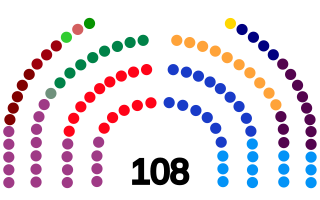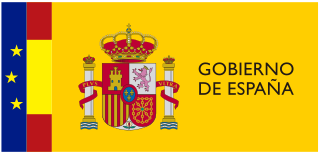Related Research Articles
A convention, also known as a constitutional convention, is an uncodified tradition that is followed by the institutions of a state. In some states, notably those Commonwealth states that follow the Westminster system and whose political systems derive from British constitutional law, most government functions are guided by constitutional convention rather than by a formal written constitution. In these states, actual distribution of power may be markedly different from those the formal constitutional documents describe. In particular, the formal constitution often confers wide discretionary powers on the head of state that, in practice, are used only on the advice of the head of government, and in some cases not at all.
A constitutional amendment is a modification of the constitution of a polity, organization or other type of entity. Amendments are often interwoven into the relevant sections of an existing constitution, directly altering the text. Conversely, they can be appended to the constitution as supplemental additions, thus changing the frame of government without altering the existing text of the document.

The Spanish Constitution is the supreme law of the Kingdom of Spain. It was enacted after its approval in a constitutional referendum; it represents the culmination of the Spanish transition to democracy.

A decree is a legal proclamation, usually issued by a head of state, judge, royal figure, or other relevant authorities, according to certain procedures. These procedures are usually defined by the constitution, Legislative laws, or customary laws of a government.
Ratification is a principal's legal confirmation of an act of its agent. In international law, ratification is the process by which a state declares its consent to be bound to a treaty. In the case of bilateral treaties, ratification is usually accomplished by exchanging the requisite instruments, and in the case of multilateral treaties, the usual procedure is for the depositary to collect the ratifications of all states, keeping all parties informed of the situation.

The Congress of the Republic of Colombia is the name given to Colombia's bicameral national legislature.
The Necessary and Proper Clause, also known as the Elastic Clause, is a clause in Article I, Section 8 of the United States Constitution:
The Congress shall have Power... To make all Laws which shall be necessary and proper for carrying into Execution the foregoing Powers, and all other Powers vested by this Constitution in the Government of the United States, or in any Department or Officer thereof.
A supermajority is a requirement for a proposal to gain a specified level of support which is greater than the threshold of one-half used for a simple majority. Supermajority rules in a democracy can help to prevent a majority from eroding fundamental rights of a minority, but can also hamper efforts to respond to problems and encourage corrupt compromises at times when action is taken. Changes to constitutions, especially those with entrenched clauses, commonly require supermajority support in a legislature. Parliamentary procedure requires that any action of a deliberative assembly that may alter the rights of a minority have a supermajority requirement, such as a two-thirds vote. In consensus democracy the supermajority rule is applied in most cases.

The Council of Ministers is the main collective decision-making body of the Government of Spain, and it is exclusively composed of the Prime Minister, the deputy prime ministers and the ministers. Junior or deputy ministers such as the Secretaries of State are not members of the Council. The Monarch may also chair the Council when needed on the invitation of the Prime Minister.

The government of Spain is the central government which leads the executive branch and the General State Administration of the Kingdom of Spain.

The Political Constitution of Colombia of 1991, is the Constitution of the Republic of Colombia. It was promulgated in Constitutional Gazette number 114 on Sunday, July 7, 1991, and is also known as the Constitution of Human Rights. It replaced the Political Constitution of 1886 and was issued during the presidency of the liberal César Gaviria, with ideas from the also liberal Luis Carlos Galán.

The Council of Ministers is the principal executive organ of the Government of Italy. It comprises the President of the Council, all the ministers, and the Undersecretary to the Prime Minister. Deputy ministers and junior ministers are part of the government, but are not members of the Council of Ministers.
The Law of Spain is the legislation in force in the Kingdom of Spain, which is understood to mean Spanish territory, Spanish waters, consulates and embassies, and ships flying the Spanish flag in democratically elected institutions.
The Constitution of the Philippines is the supreme law of the Philippines. Its final draft was completed by the Constitutional Commission on October 12, 1986, and ratified by a nationwide plebiscite on February 2, 1987. The Constitution remains unamended to this day.
A Necessity and Urgency Decree is a special kind of order issued by the President of Argentina. Unlike regular decrees, which are used in Argentina for rulemaking, a DNU has the force of law. Once the President promulgates a DNU, it comes into force almost immediately; afterwards, the National Congress must examine the decree to determine whether it will be allowed to remain in force or not.
The royal prerogative is a body of customary authority, privilege, and immunity recognized in common law as belonging to the sovereign, and which have become widely vested in the government. It is the means by which some of the executive powers of government, possessed by and vested in a monarch with regard to the process of governance of the state, are carried out.
The Supremacy Clause of the Constitution of the United States establishes that the Constitution, federal laws made pursuant to it, and treaties made under its authority, constitute the "supreme Law of the Land", and thus take priority over any conflicting state laws. It provides that state courts are bound by, and state constitutions subordinate to, the supreme law. However, federal statutes and treaties must be within the parameters of the Constitution; that is, they must be pursuant to the federal government's enumerated powers, and not violate other constitutional limits on federal power, such as the Bill of Rights—of particular interest is the Tenth Amendment to the United States Constitution, which states that the federal government has only those powers that are delegated to it by the Constitution. It is the responsibility of the United States Supreme Court in that case to exercise the power of judicial review: the ability to invalidate a statute for violating a provision of the Constitution.

The law of Italy is the system of law across the Italian Republic. The Italian legal system has a plurality of sources of production. These are arranged in a hierarchical scale, under which the rule of a lower source cannot conflict with the rule of an upper source.
A Royal Legislative Decree is a legal rule having the force of a law in the Spanish legal system. The name of "Royal" is given because it has state rank and it is the King who is responsible for sanctioning and ordering the publication and compliance of the rule and the name of "Legislative" is given because it is a delegation from parliament. However, when the rule is created by an autonomous government, it receives the name of "Legislative Decree" because the King only sanctions the Decrees of the central government.
The National Board of Justice, formerly the National Council of the Magistracy, is an autonomous constitutional institution that is part of the Republic of Peru. Its primary function is to appoint and ratify all judges and prosecutors in the Peruvian justice system as well as to remove those that fail to fulfill their responsibilities.